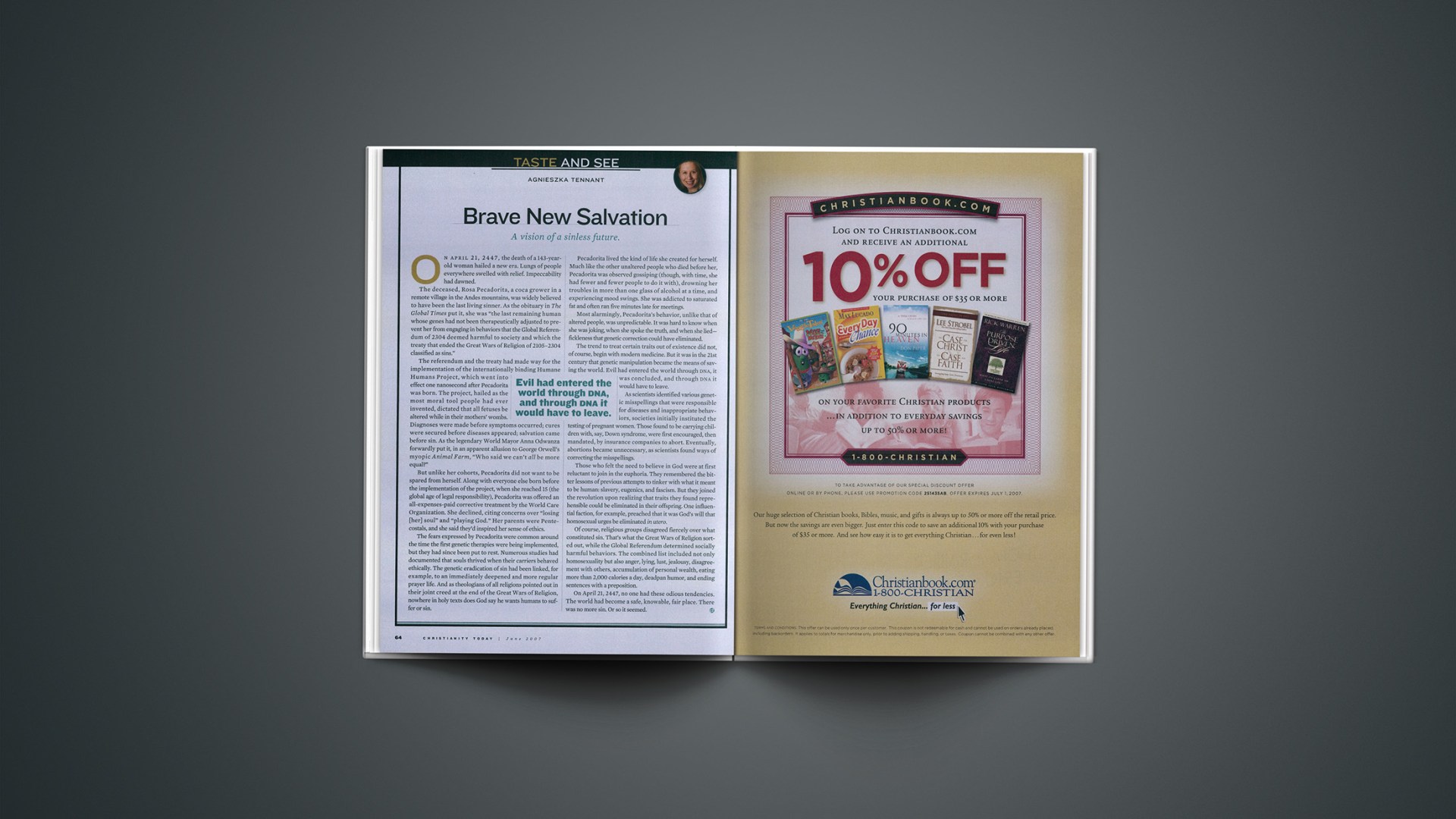On April 21, 2447, the death of a 143-year-old woman hailed a new era. Lungs of people everywhere swelled with relief. Impeccability had dawned.
The deceased, Rosa Pecadorita, a coca grower in a remote village in the Andes mountains, was widely believed to have been the last living sinner. As the obituary in The Global Times put it, she was “the last remaining human whose genes had not been therapeutically adjusted to prevent her from engaging in behaviors that the Global Referendum of 2304 deemed harmful to society and which the treaty that ended the Great Wars of Religion of 2105-2304 classified as sins.”
The referendum and the treaty had made way for the implementation of the internationally binding Humane Humans Project, which went into effect one nanosecond after Pecadorita was born. The project, hailed as the most moral tool people had ever invented, dictated that all fetuses be altered while in their mothers’ wombs. Diagnoses were made before symptoms occurred; cures were secured before diseases appeared; salvation came before sin. As the legendary World Mayor Anna Odwanza forwardly put it, in an apparent allusion to George Orwell’s myopic Animal Farm, “Who said we can’t all be more equal?”
But unlike her cohorts, Pecadorita did not want to be spared from herself. Along with everyone else born before the implementation of the project, when she reached 15 (the global age of legal responsibility), Pecadorita was offered an all-expenses-paid corrective treatment by the World Care Organization. She declined, citing concerns over “losing [her] soul” and “playing God.” Her parents were Pentecostals, and she said they’d inspired her sense of ethics.
The fears expressed by Pecadorita were common around the time the first genetic therapies were being implemented, but they had since been put to rest. Numerous studies had documented that souls thrived when their carriers behaved ethically. The genetic eradication of sin had been linked, for example, to an immediately deepened and more regular prayer life. And as theologians of all religions pointed out in their joint creed at the end of the Great Wars of Religion, nowhere in holy texts does God say he wants humans to suffer or sin.
Pecadorita lived the kind of life she created for herself. Much like the other unaltered people who died before her, Pecadorita was observed gossiping (though, with time, she had fewer and fewer people to do it with), drowning her troubles in more than one glass of alcohol at a time, and experiencing mood swings. She was addicted to saturated fat and often ran five minutes late for meetings.
Most alarmingly, Pecadorita’s behavior, unlike that of altered people, was unpredictable. It was hard to know when she was joking, when she spoke the truth, and when she lied—fickleness that genetic correction could have eliminated.
The trend to treat certain traits out of existence did not, of course, begin with modern medicine. But it was in the 21st century that genetic manipulation became the means of saving the world. Evil had entered the world through DNA, it was concluded, and through DNA it would have to leave.
As scientists identified various genetic misspellings that were responsible for diseases and inappropriate behaviors, societies initially instituted the testing of pregnant women. Those found to be carrying children with, say, Down syndrome, were first encouraged, then mandated, by insurance companies to abort. Eventually, abortions became unnecessary, as scientists found ways of correcting the misspellings.
Those who felt the need to believe in God were at first reluctant to join in the euphoria. They remembered the bitter lessons of previous attempts to tinker with what it meant to be human: slavery, eugenics, and fascism. But they joined the revolution upon realizing that traits they found reprehensible could be eliminated in their offspring. One influential faction, for example, preached that it was God’s will that homosexual urges be eliminated in utero.
Of course, religious groups disagreed fiercely over what constituted sin. That’s what the Great Wars of Religion sorted out, while the Global Referendum determined socially harmful behaviors. The combined list included not only homosexuality but also anger, lying, lust, jealousy, disagreement with others, accumulation of personal wealth, eating more than 2,000 calories a day, deadpan humor, and ending sentences with a preposition.
On April 21, 2447, no one had these odious tendencies. The world had become a safe, knowable, fair place. There was no more sin. Or so it seemed.
Copyright © 2007 Christianity Today. Click for reprint information.
Related Elsewhere:
Christianity Today‘s special section on life ethics includes “Re-engineering Temptation,” on the debate over whether genetic therapy should be used to reverse homosexuality.
Previous Taste and See columns include:
Desire Happens | You see, you want. Then what? (March 29, 2007)
‘Ordinary’ Delights | Let us praise the consoling banality of good. (March 13, 2007)
Dating Jesus | When ‘lover of my soul’ language goes too far. (December 6, 2006)
To Russia with Fury | Sometimes charity means anger. (October 9, 2006)
What (Not All) Women Want | The finicky femininity of ‘Captivating’ by John and Stasi Eldredge. (August 1, 2006)
A Velveteen Apologetic | How two creatures dig a rabbit hole in my disbelief. (April 1, 2006)
What Would Jesus Buy? | Saving the world one cashmere sweater at a time. (February 1, 2006)










